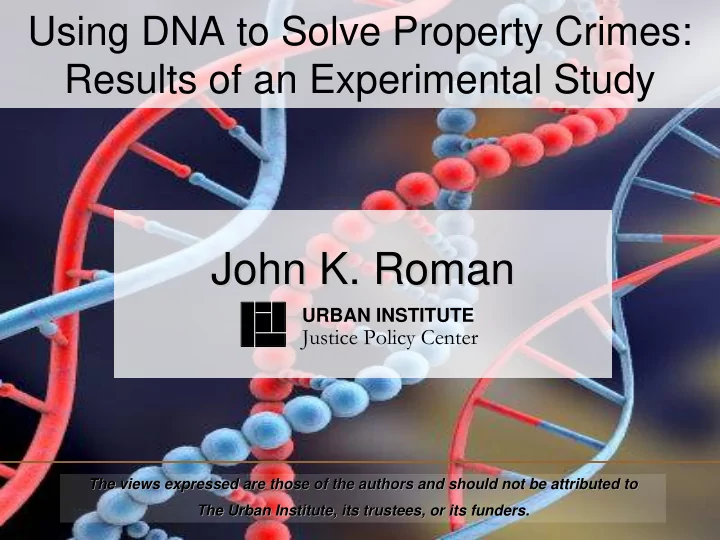

Using DNA to Solve Property Crimes: Results of an Experimental Study John K. Roman John K. Roman URBAN INSTITUTE Justice Policy Center The views expressed are those of the authors and should not be attributed to ttributed to The views expressed are those of the authors and should not be a The Urban Institute, its trustees, or its funders. The Urban Institute, its trustees, or its funders.
A Randomized Study… • Studies the cost-effective of DNA compared to traditional crime-solving strategies in property crime – mainly residential burglaries;
…in Five Communities in Four States Police in LA, OC, Phoenix, Denver, and Topeka: Submit data for 500 property cases where biological evidence (i.e., saliva, blood, etc.) is present.
Cases are Randomly Assigned DNA in 500 cases: Test Cases (250): • Traditional Investigation & DNA Testing; Control Cases (250) - Traditional Investigation only
Cases Enrolled in the Experiment Site Location Total Test Total Control Total Cases Cases Cases Topeka, KS 131 129 260 Los Angeles, CA 193 198 391 Denver, CO 255 255 510 Orange County, CA 250 251 501 Phoenix, AZ 251 249 500 Total 1080 1082 2162
Study Conclusions - ID • Suspects identified in 31% of cases where DNA evidence is tested. • Suspects identified in 12% w/ traditional inv. only;
Study Conclusions - Arrest • Suspects arrested in 16% of cases where DNA evidence is tested (n=173). • Suspects arrested in 8% w/ traditional inv. only (n=86);
Study Conclusions – Value of DNA Suspect identification • Fingerprints, Eyewitness ID suspect in 12% of cases for both cohorts. Additionally, in DNA cases: • 16% ID by offender hit; • 3% ID by forensic hit.
Who is being arrested? DNA Suspects have more (and more serious) priors - DNA arrestees had 2.9 prior felony convictions and 5.6 prior felony arrests. - Arrestees identified by traditional investigation had 0.9 prior felony convictions and 1.7 prior felony arrests.
What Does it Cost to Add DNA? Cost to ID a new suspect: $4,514 Cost of a new arrest: $14,178 Cost of a new case that was accepted for prosecution: $6,913.
Best Case Costs? The Denver Experience Cost to ID a new suspect: $1,466 Cost of a new arrest: $3,679 Cost of a new case that was accepted for prosecution: $1,903.
Recommend
More recommend